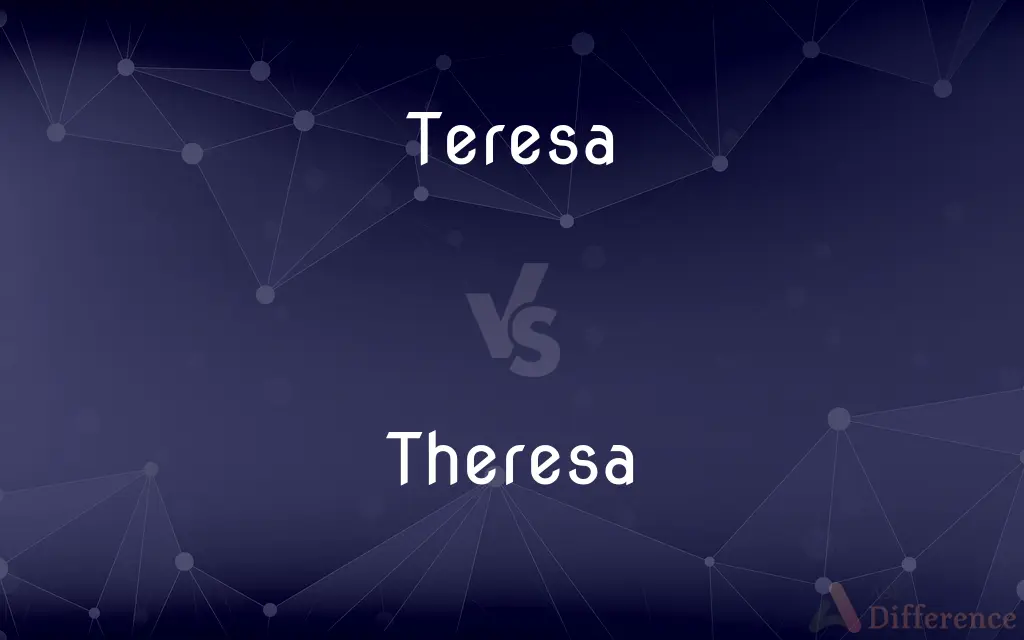Teresa vs. Theresa — What's the Difference?
By Tayyaba Rehman — Updated on November 7, 2023
"Teresa" and "Theresa" are both feminine names with the same origin, differing mainly in spelling and regional usage.

Difference Between Teresa and Theresa
Table of Contents
ADVERTISEMENT
Key Differences
Teresa and Theresa are essentially the same name, with variations in spelling. The name Teresa is believed to be of Greek origin, derived from the word "therizein," meaning to reap or to harvest. It is commonly used in Italian, Spanish, Portuguese, and Polish cultures.
Theresa, with an 'h,' is a variant spelling that is common in English and German-speaking countries. The presence of the 'h' does not change the pronunciation of the name significantly, and in some languages, the 'h' may be silent.
Both Teresa and Theresa have been borne by numerous notable figures, including saints, which has contributed to the name's popularity over time. The most famous Teresa is Mother Teresa, known for her humanitarian work, and Saint Teresa of Avila, a prominent Spanish mystic.
The choice between Teresa and Theresa often comes down to personal or familial preference. In some cases, it might reflect a cultural connection, with Teresa being favored in Latin-based languages and Theresa in English-speaking contexts.
Regardless of spelling, the names carry the same general connotations of tradition and have a classic, timeless quality. Both names have been used for centuries and continue to be popular choices for girls around the world.
ADVERTISEMENT
Comparison Chart
Spelling Variation
Common in Latin countries
Common in English-speaking countries
Pronunciation
"te-RE-sa" or "te-REH-sah"
"te-RE-sa" or "te-REH-sah"
Cultural Association
Italian, Spanish, Polish
English, German
Notable Figures
Mother Teresa, Saint Teresa of Avila
Theresa May, Saint Thérèse of Lisieux
Usage
Without an 'h'
With an 'h'
Compare with Definitions
Teresa
A female given name.
Teresa is an excellent student.
Theresa
The name may imply a strong and decisive character, possibly inspired by figures like Theresa May.
Theresa made a decisive move in the chess match.
Teresa
Used to denote a classic and traditional name choice.
They named their daughter Teresa, after her grandmother.
Theresa
Represents a variant of the name Teresa popular in English-speaking countries.
They spelled her name Theresa, with an 'h'.
Teresa
Can refer to Saint Teresa of Avila.
Teresa's writings are influential in Christian mysticism.
Theresa
A name with a timeless and classical appeal.
Theresa is a name that never seems to go out of style.
Teresa
A name that has been popular in various cultures.
In our Spanish class, there are two girls named Teresa.
Theresa
A female given name.
Theresa was elected class president.
Teresa
The name suggests a person who is caring and giving, inspired by Mother Teresa.
Teresa always volunteers at the shelter.
Theresa
Can reference Saint Thérèse of Lisieux, often known as "The Little Flower."
Theresa's favorite saint is Thérèse of Lisieux.
Teresa
Teresa, Theresa and Therese (French: Thérèse) are feminine given names. The name may be derived from the Greek verb θερίζω (therízō), meaning "to harvest".
Theresa
Indian nun and missionary (born in Albania) dedicated to helping the poor in India (1910-1997)
Teresa
(obsolete) A type of light lady's kerchief in the late eighteenth century.
Teresa
Indian nun and missionary (born in Albania) dedicated to helping the poor in India (1910-1997)
Common Curiosities
Which spelling is more common, Teresa or Theresa?
It varies by region and language.
Can Teresa and Theresa be considered international names?
Yes, both are widely recognized and used internationally.
Why do some spell it as Teresa and others as Theresa?
It often depends on cultural or family preferences.
Does the 'h' in Theresa affect pronunciation?
Typically, no; both are pronounced similarly.
What is the main difference between Teresa and Theresa?
The difference is in spelling; "Teresa" is a variation of "Theresa," and both are used to represent the same name.
Is Teresa a different name from Theresa?
No, they are variations of the same name, with different spellings.
Are there different diminutives or nicknames for Teresa and Theresa?
Common diminutives like Terry or Tess are used for both.
How do you decide which spelling to use for a child's name?
It's a personal choice, sometimes influenced by naming traditions.
Is there a difference in pronunciation between Teresa and Theresa?
Generally, Teresa is pronounced as "teh-REH-sah," while Theresa may be pronounced as "the-REH-sah" or "treh-SAH," depending on regional variations.
Are Teresa and Theresa interchangeable?
They are not interchangeable since they are individual spellings of a person's name. It depends on the preferred spelling of the individual.
Are there saints with the name Teresa or Theresa?
Yes, there are several saints named Teresa or Theresa.
Can Teresa and Theresa have different nicknames?
Common nicknames for both can include Terri, Terry, Tessa, or Tess.
Which spelling is more popular, Teresa or Theresa?
Popularity can vary by region and time period. Historically, "Theresa" has been more common, but "Teresa" has seen equal usage.
Are there any famous people that might influence the spelling of Teresa/Theresa?
Yes, for instance, Mother Teresa, known for her humanitarian work, might influence the preference for the spelling "Teresa."
How do I know whether to use Teresa or Theresa when writing someone’s name?
You should use the spelling that the individual uses, as names are personal and unique to each person.
Does Teresa or Theresa have a specific origin?
Both names have similar roots in Greek and are derived from the word "therizein," meaning to harvest.
Share Your Discovery

Previous Comparison
Pillow vs. Cushion
Next Comparison
Collier vs. MinerAuthor Spotlight
Written by
Tayyaba RehmanTayyaba Rehman is a distinguished writer, currently serving as a primary contributor to askdifference.com. As a researcher in semantics and etymology, Tayyaba's passion for the complexity of languages and their distinctions has found a perfect home on the platform. Tayyaba delves into the intricacies of language, distinguishing between commonly confused words and phrases, thereby providing clarity for readers worldwide.















































